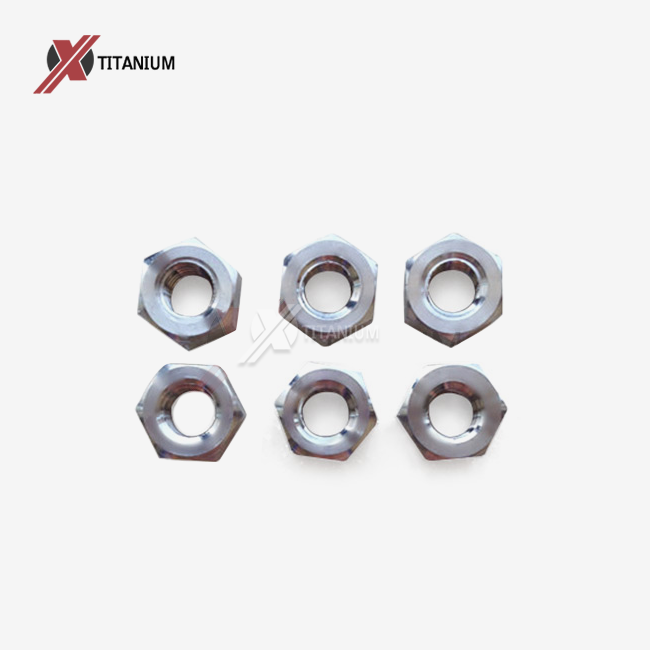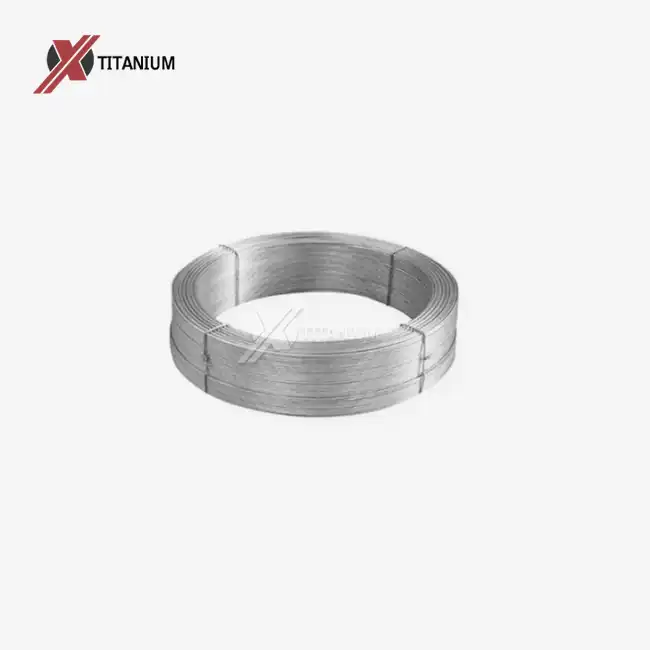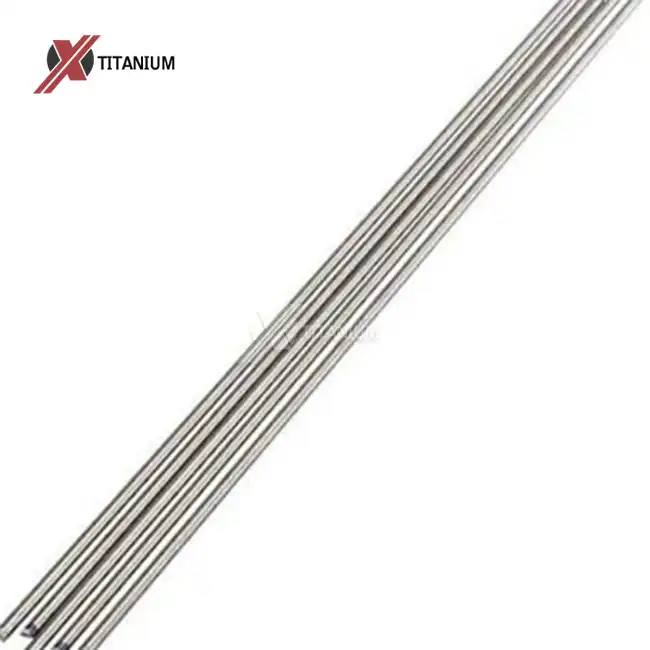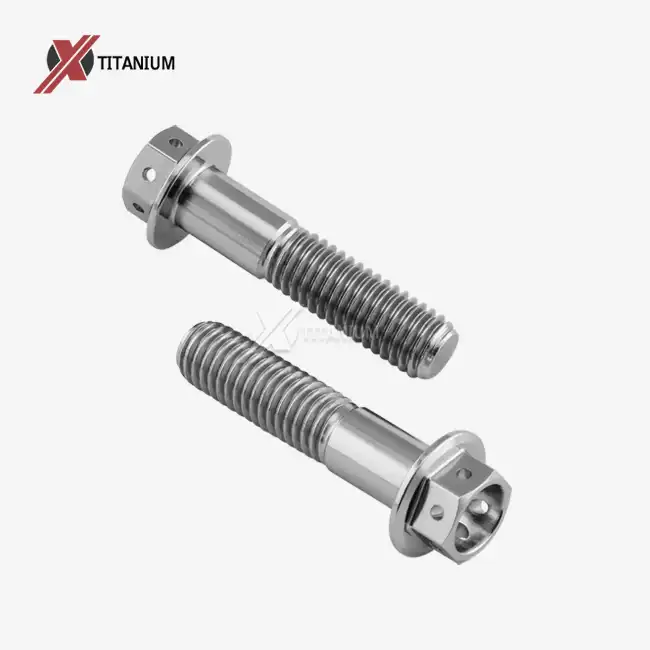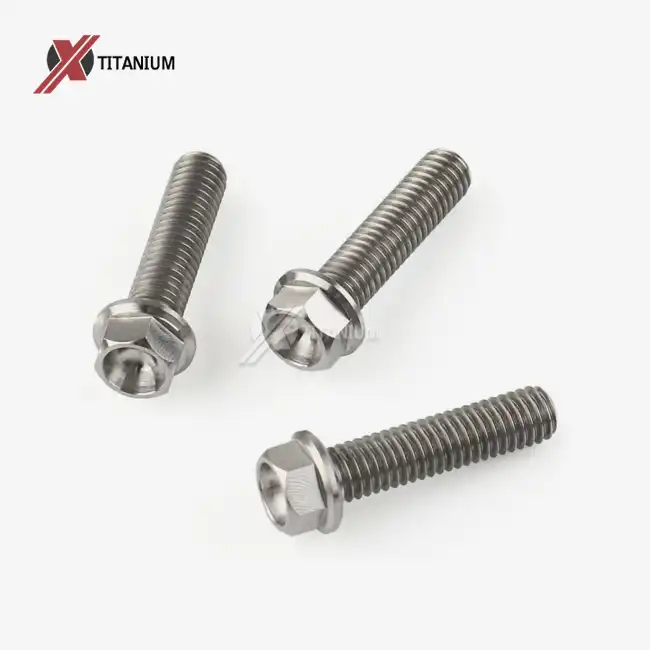Understanding the Unique Properties of Grade 2 Titanium Hex Nuts
Composition and Mechanical Characteristics
Grade 2 titanium, also known as commercially pure (CP) titanium, is composed of 99.2% pure titanium with trace amounts of other elements. This composition results in titanium hex nuts that exhibit remarkable mechanical properties. They boast a tensile strength ranging from 50,000 to 65,000 psi, which is comparable to many steel alloys but at a significantly lower weight. The yield strength of Grade 2 titanium typically falls between 40,000 and 55,000 psi, providing excellent resistance to deformation under load.
These titanium hex nuts also demonstrate exceptional ductility, with an elongation percentage of 20% or more. This characteristic allows for some degree of flexibility without compromising the integrity of the fastener. The combination of strength and ductility makes Grade 2 titanium hex nuts resilient against fatigue and capable of withstanding dynamic loads, a crucial factor in many general-use applications.
Corrosion Resistance and Chemical Inertness
One of the standout features of Grade 2 titanium hex nuts is their superior corrosion resistance. Titanium naturally forms a protective oxide layer on its surface when exposed to oxygen, creating a barrier against corrosive substances. This self-passivating property enables titanium hex nuts to resist corrosion in environments where other metals would rapidly degrade. They maintain their integrity in saltwater, making them ideal for marine applications, and can withstand exposure to various acids, alkalis, and chlorides.
The chemical inertness of Grade 2 titanium also contributes to its suitability for general use. These hex nuts do not react with most chemicals or bodily fluids, ensuring they remain stable in diverse operating conditions. This characteristic is particularly valuable in industries such as chemical processing, where the fasteners may come into contact with aggressive substances.
Thermal and Electrical Properties
Grade 2 titanium hex nuts exhibit unique thermal properties that enhance their versatility. They have a relatively low thermal conductivity compared to other metals, which can be advantageous in applications where heat transfer needs to be minimized. The coefficient of thermal expansion for Grade 2 titanium is also lower than that of many other metals, reducing the risk of loosening or distortion in temperature-fluctuating environments.
In terms of electrical properties, they are non-magnetic and have poor electrical conductivity. These characteristics make them suitable for use in applications where magnetic interference or electrical insulation is required. The non-magnetic nature of titanium is particularly beneficial in medical and scientific equipment where magnetic fields must be carefully controlled.
Applications and Industries Benefiting from Grade 2 Titanium Hex Nuts
Aerospace and Aviation
The aerospace industry has long recognized the value of titanium hex nuts in aircraft construction. The high strength-to-weight ratio of Grade 2 titanium makes these fasteners an excellent choice for reducing overall weight without compromising structural integrity. Titanium hex nuts are commonly used in engine components, airframe structures, and landing gear assemblies. Their resistance to fatigue and ability to withstand extreme temperatures further solidify their position as a preferred fastener in aviation applications.
In the space sector, Grade 2 titanium hex nuts play a crucial role in satellite and spacecraft construction. The vacuum of space and the rapid temperature fluctuations encountered during orbital cycles demand fasteners that can maintain their properties under such harsh conditions. The low thermal expansion and high corrosion resistance of products make them ideal for these challenging environments.
Marine and Offshore Industries
The marine environment is notoriously harsh on metal components, with constant exposure to saltwater and humid conditions. Grade 2 titanium hex nuts excel in this setting due to their exceptional corrosion resistance. They are widely used in shipbuilding, offshore oil rigs, and underwater equipment. The ability of these fasteners to resist galvanic corrosion when in contact with other metals is particularly valuable in marine applications, where mixed-metal assemblies are common.
Titanium hex nuts also find extensive use in desalination plants and other seawater processing facilities. Their resistance to chloride-induced stress corrosion cracking ensures long-term reliability in systems handling brine and other corrosive fluids. The lightweight nature of titanium fasteners also contributes to reduced overall weight in marine structures, improving fuel efficiency and maneuverability.
Medical and Biomedical Applications
The biocompatibility of Grade 2 titanium makes it an excellent material for medical implants and devices. Titanium hex nuts are used in various orthopedic and dental applications, where they provide secure fixation without the risk of adverse reactions with human tissue. The non-magnetic properties of titanium are particularly important in medical settings, allowing patients with titanium implants to safely undergo MRI scans.
In the biomedical research field, Grade 2 titanium hex nuts are often employed in laboratory equipment and experimental setups. Their chemical inertness ensures that they do not interfere with sensitive biological processes or contaminate samples. The ease of sterilization and resistance to repeated autoclave cycles further enhance their suitability for medical and research applications.
Comparative Advantages of Grade 2 Titanium Hex Nuts Over Alternative Materials
Weight Reduction and Strength Comparison
When compared to traditional steel fasteners, Grade 2 titanium hex nuts offer significant weight savings without compromising on strength. Titanium has a density of approximately 4.5 g/cm³, which is about 45% less than that of steel. This translates to a substantial weight reduction in applications where multiple fasteners are used. Despite being lighter, Grade 2 titanium hex nuts maintain a strength-to-weight ratio that surpasses many steel alloys, allowing for the same or better performance with less material.
In contrast to aluminum fasteners, which are also known for their lightweight properties, the products provide superior strength and durability. While aluminum may offer a marginally lower weight, it lacks the tensile strength and fatigue resistance of titanium, making Grade 2 titanium hex nuts a more reliable choice for applications requiring long-term structural integrity.
Corrosion Resistance and Longevity
The corrosion resistance of Grade 2 titanium hex nuts is unparalleled when compared to most other metals used in fastener production. Unlike stainless steel, which can suffer from pitting and crevice corrosion in chloride-rich environments, titanium remains virtually unaffected. This superior corrosion resistance translates to extended service life and reduced maintenance requirements, particularly in harsh environments.
Compared to brass or bronze fasteners, which are often chosen for their corrosion resistance in marine applications, titanium hex nuts offer better mechanical properties and a wider range of chemical resistance. While brass and bronze may suffice in some marine settings, they cannot match the overall performance and versatility of Grade 2 titanium in extreme conditions.
Cost-Effectiveness and Long-Term Value
While the initial cost of Grade 2 titanium hex nuts is higher than that of steel or aluminum alternatives, their long-term value proposition is compelling. The extended service life and reduced maintenance requirements of titanium fasteners often result in lower total lifecycle costs. In applications where fastener failure could lead to significant downtime or safety risks, the reliability of titanium hex nuts provides additional value through risk mitigation.
Furthermore, the versatility of Grade 2 titanium hex nuts allows for standardization across various applications within an organization. This can lead to simplified inventory management and reduced complexity in procurement processes. When considering the overall economic impact, including factors such as weight savings in transportation applications or reduced corrosion-related failures, Grade 2 titanium hex nuts often emerge as a cost-effective solution for general use.
Conclusion
Grade 2 titanium hex nuts have established themselves as an ideal choice for general use across a wide spectrum of industries and applications. Their unique combination of strength, lightweight construction, and exceptional corrosion resistance provides solutions to many engineering challenges. From aerospace to marine environments, and from medical implants to industrial machinery, these versatile fasteners continue to prove their worth.
As industries increasingly prioritize efficiency, durability, and performance, the adoption of Grade 2 titanium hex nuts is likely to grow. For those seeking to optimize their fastener solutions, exploring the potential of products could lead to significant improvements in product performance and longevity. To learn more about how Grade 2 titanium hex nuts can benefit your specific application, please contact us at info@cltifastener.com or djy6580@aliyun.com.
